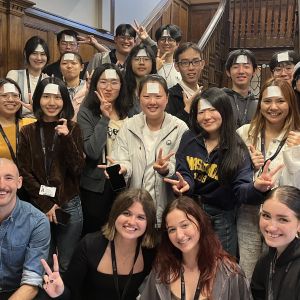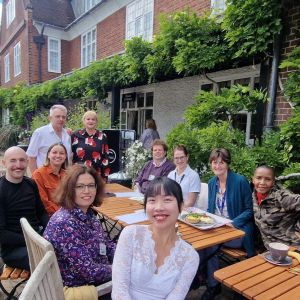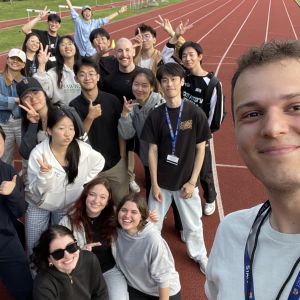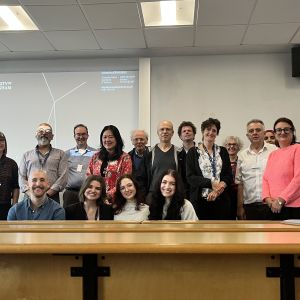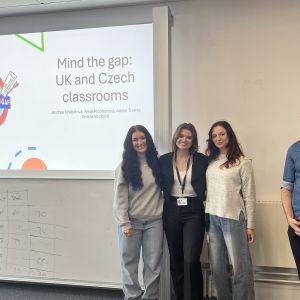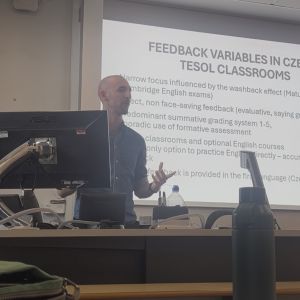Why It Is Important for English Teacher-Training Students to Have the Opportunity to Undertake an Internship Abroad
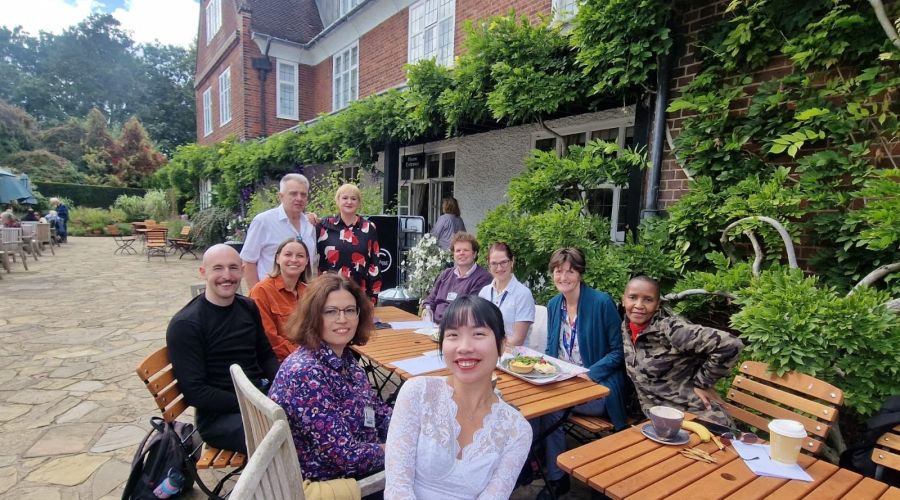
In summer 2025, Adam Tretter, a student of the Department of English Studies, Faculty of Arts, University of South Bohemia, undertook a two-month teaching internship at the Birmingham International Academy, University of Birmingham (UK). During the placement, he was involved in pre-sessional courses, organised extracurricular activities for international students, and co-led language workshops. The internship provided him with valuable teaching practice, enhanced his linguistic and intercultural competences, and contributed to his personal and professional development.
I am studying at the Department of English Studies, Faculty of Arts, University of South Bohemia in České Budějovice (USB), specialising in secondary-school teaching of English and history. Thanks to our department’s long-standing contacts with the Birmingham International Academy (https://www.birmingham.ac.uk/international/bia) at the University of Birmingham (UK), I was able to undertake an international teaching internship there this summer. I undertook the internship together with Andrea Hrabíková, Tereza Vacková and Nela Plouharová.
I spent 67 days in Birmingham. During my internship, I was able to observe the summer pre-sessional courses for international students at the Birmingham International Academy. In my experience, the opportunity to travel abroad during the holidays and gain international teaching practice without missing classes and exams during the semester at USB was invaluable for me as a future English teacher.
During the placement, I not only observed classes but also actively participated in workshops for students and in language-support sessions outside the main teaching programme. Together with my fellow colleagues, I regularly organised a Conversation Café, where students could further develop and practise their language skills in an informal environment outside regular lessons. My colleagues and I also had the chance to prepare and lead one of the regular workshops for teacher development. Outside teaching, I worked mainly with the Social Team, which was responsible for planning and organising a wide variety of events for students, ranging from art activities, picnics and sports days to full-day weekend trips to Oxford, London and Liverpool, in which I was also able to participate.
From a linguistic perspective, I had to adapt quickly, as I was not used to using English as my main language of communication throughout the day. The cultural dimension was also significant, especially when communicating with international students, mostly from Asia (China, Thailand, Taiwan, Hong Kong), who tended to have a more reserved communication style than Czech or English students. I often felt they were reluctant to engage in conversation, but in most cases the individual was simply waiting for a pause so as not to interrupt or appear impolite. The entire Birmingham International Academy team was very welcoming and supportive, which enabled us to engage in a wide variety of activities and to gain valuable practical experience as well as insights from more experienced teachers.
In the academic English classes, the focus was primarily on practising fluency, reading comprehension and argumentative writing. Commonly used activities included seminar discussions and working with academic texts. Great emphasis was also placed on the development of critical thinking, analysis and the ability to present and defend one’s opinion in discussion. Authentic materials and real-life situations were widely used, which helped to strengthen students’ practical skills. What surprised me most was that the academic articles were not chosen according to the students’ fields of study, which were very diverse (ranging from robotics, finance, law and psychology to applied linguistics), but rather according to their usefulness for teaching academic English.
The most important lesson for me was stepping out of my comfort zone and experimenting. It is worthwhile to get the most out of an internship abroad and try as wide a range of activities as possible, even if they may seem stressful at first. In my case, these activities included independently planning social events for students, providing feedback in a completely different cultural context, and presenting a specialised topic to 25 experienced teachers of English as a foreign language. Personal experience is particularly valuable when it is gained through practical engagement. Without a doubt, it is worth trying such things for yourself, even if you do not feel ready at first. After all, you always learn more through practice than by keeping a theoretical distance in the comfort of a lecture hall.
For students considering a similar experience, I would recommend carefully reflecting on your personal feelings and consulting your loved ones or asking students who have already undertaken such an internship about their experiences. Upon arrival, it is advisable to be proactive, open and communicative, and to get to know as many BIA staff members as possible. An internship in Birmingham can provide not only valuable teaching practice but also an insight into the practical application of many of the concepts we study in theory at university (such as intercultural communication, different teaching styles and lesson planning), as well as new career opportunities.
In my view, what matters is not whether a placement abroad is compulsory or optional, but that teacher-training students have a real opportunity to undertake such an experience during their studies. An internship abroad not only enriches you practically in the field of language teaching but also broadens your cultural awareness and contributes significantly to the development of your own language competence. Anyone who takes advantage of such an opportunity will find that it is an experience that truly pays off – there is absolutely nothing to lose. Finally, I would like to express my gratitude for the scholarship that made this internship possible and thanks to which I was able to gain invaluable professional and personal experience.

